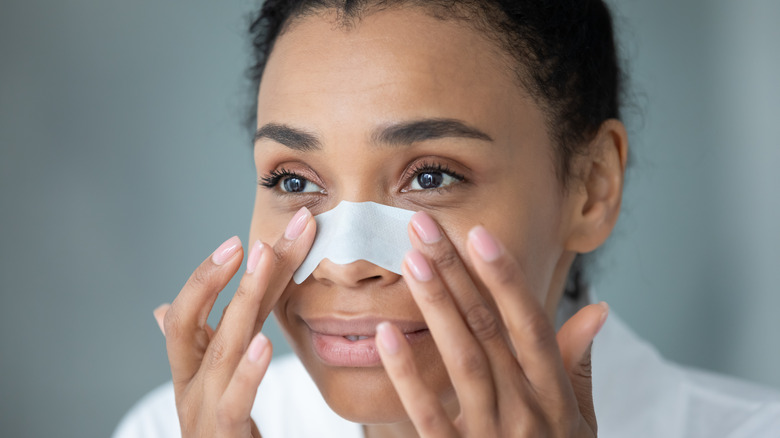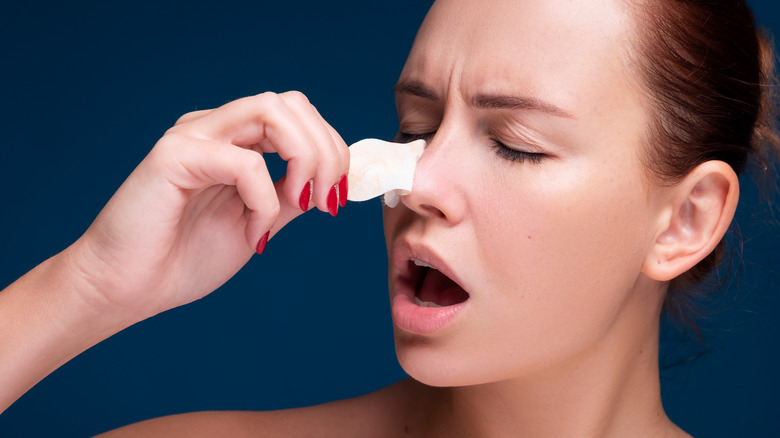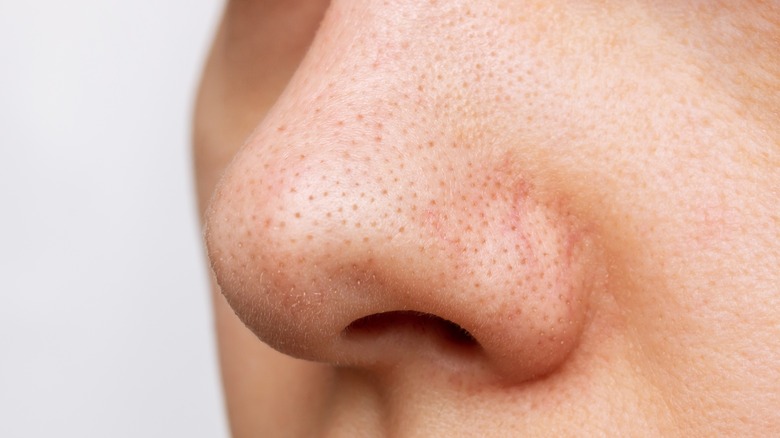Sorry, But Your Gratifying Pore Strips Aren't Your Best Blackhead Defense
Few things are more infuriating than blackheads taking over your T-zone. Not only are they unsightly, but they're also notoriously difficult to remove. You're lucky if you're able to take them out with cleansing and exfoliation, but if they dig through your pores deeper, you're in tough luck. The pesky blemishes are caused by oil and dead skin cells, but unlike pimples that you can remove by mere popping (don't do this, of course), blackheads are more stubborn. As a result, many resort to abrasive methods to get rid of them — especially on the nose.
The most popular blackhead removal method of choice? Pore strips, aka those little strips with adhesives that you put on your nose to extract blackheads in one fell swoop. They clear clogged pores almost instantaneously, but the tradeoff is that, for one, the process is rather painful. For another, they can result in irritation or, worse, skin damage.
As satisfying as it is to yank out debris in one go, frequent use of pore strips can also lead to over-exfoliation and even enlargement of pores. You're better off using other pore-clearing methods if you want to protect your skin barrier.
Pore strips can be potentially damaging
Pore strips are popular for a reason. You can't discount their sheer ability to get rid of the stubborn gunk that had been stuck in your pores for so long. The adhesive on the surface of the strip is powerful enough to rip them out, but the bad news is the results are temporary. Dr. Mona Gohara, assistant clinical professor at Yale, even told Marie Claire that when you use pore strips, you're not actually clearing your pores — you're pulling off the top layer of your skin instead. "Your pores are like a bottle of soda — all these products do is take off the cap, rather than empty the whole bottle, so you're still left with a clogged pore," she explained.
Even more bad news? Pore strips can harm your skin if you use them frequently. "You could strip the skin of necessary oils and basically 'tell' your skin to ramp up its production of oil, resulting in increased shininess and oil that can block the pores," double board-certified facial plastic surgeon Dr. Jaimie DeRosa shared with Byrdie. Using pore strips once in a while should be fine, but if you allow your skin to get used to extreme exfoliation, you can accelerate sebum production, which may lead to even more blackheads.
Additionally, considering pore strips remove blackheads in a forceful way, you also risk stretching out your pores, which is the last thing you want to happen since they can never go back to the way they were.
The safer way to clear your pores
Blackheads are ever-recurring, so you can expect to get them every few weeks after clearing. If you want to kick them to the curb completely, there are products that can help do just that without being harsh on your skin like pore strips do. For starters, you can try exfoliating using tested and proven active ingredients like salicylic acid to address the root cause of blackheads. Salicylic acid is "oil-soluble," explained dermatologist Dr. Ife Rodney to Good Housekeeping. "It is able to deeply penetrate the pores and oil glands to break up the debris and sebum." AHAs like glycolic acid work just as well, since they're known to be effective in getting rid of dead skin cells on the skin's surface. You may also turn to retinoids, as "these actually improve cell turnover and clear the cause of the blockage," dished dermatologist Dr. Ismat Nasirrudin to Glamour.
As opposed to the instant gratification pore strips provide, eradicating blackheads completely requires consistent effort, but it may well be worth it if it means you'll no longer get them. If all else fails, you can always make an appointment with your dermatologist to perform a blackhead extraction. They typically use a professional-grade extractor to carry out the procedure, and while you can do the same at home, your doctor knows how to do it in a way that would not damage the surrounding skin. As always, leaving it to professionals is the way to go.


